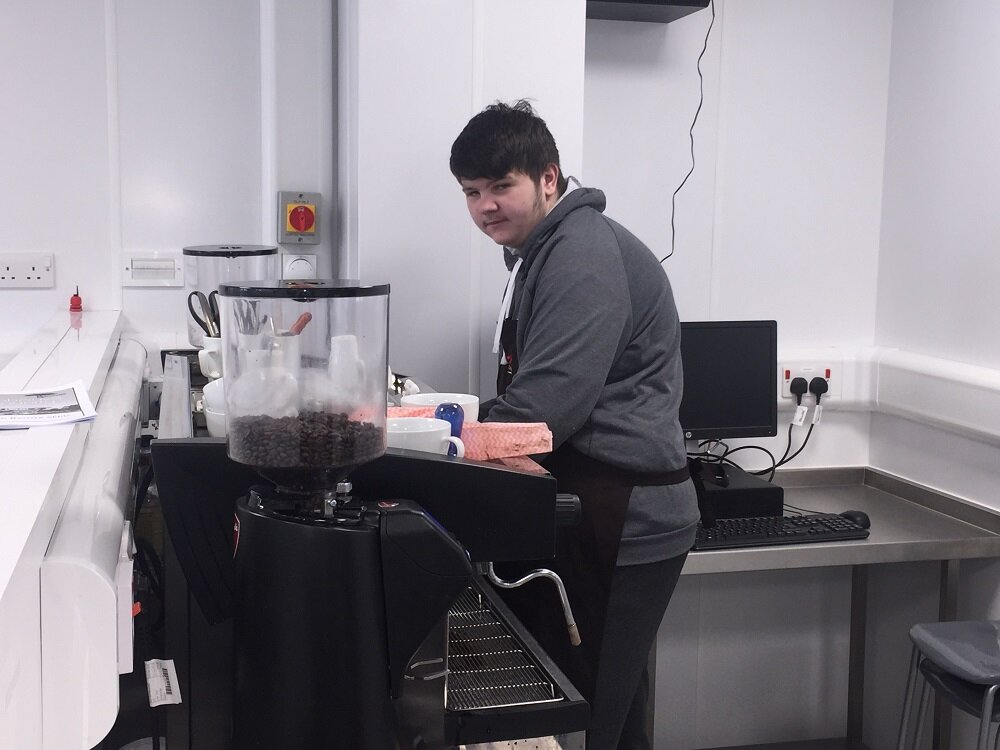Coffee shops have become such a regular feature of our towns and cities, most of us can tell a flat white from a double espresso or a skinny frappuccino.
Now the importance of coffee to the UK’s culture and economy has been recognised with the inclusion of a vocational course in the school curriculum.
A 28-week Introduction to Barista Skills course is being piloted in East Renfrewshire by Glasgow-based social enterprise company Greenhouse Community, which aims to run it in schools across the country.
The course teaches pupils from S3 to S6 about the origins of coffee and how it’s grown as well as the ethics of the coffee trade, including where coffee importers source their beans and how sustainable growers in less developed countries can work with companies to ensure they’re paid a fair price for their harvest.
Every facet of coffee making is covered from roasting to serving before students are taught how to make everything from a cappuccino to a latte or a macchiato.
The latter part of the course includes a work placement where pupils are given on-the-job experience and tutored on punctuality, independent travel and dealing with members of the public.
Greenhouse Community provides catering facilities for local authorities, public bodies and private employers, offering training and employment opportunities for staff with learning difficulties and mental health issues.
As well as providing a foothold in the jobs market for challenged and hard to reach groups, it also works with schools to offer training in catering skills for senior pupils.
Dr Ciaran McMorran, the company’s training manager who designed the course, said it has proved hugely popular with pupils and teachers.
He said: “Commercial coffee chains have their own, in-house training schemes but nobody has done barista training in schools until now and so most people who apply for jobs in cafes have no knowledge or experience of the industry.
“The course is by no means a soft option and trainees face many difficult challenges. It’s one thing being able to know how to make a coffee but working in a high-pressure environment is not for everybody.
“We’ve had trainees who really enjoyed making coffee but realised after their placement that working in the hospitality industry is not for them. The most difficult skill is being able to work under pressure.”
He added: “There has been a huge demand for places and we’re confident that it will be taken up by thousands of pupils in schools across the country.”
At the end of the course, pupils are also taught ‘soft skills’ such as how to prepare a CV, apply for a job and behave in an interview situation.
Dr McMorran said: “The objective is to get them to a stage where they’re prepared for the challenges of working in a customer-facing environment and confident enough to go out and start applying for jobs.
“From the trainee’s point of view, the rewards are obvious. From the school’s perspective, they have a ready-to-provide vocational course at their disposal, along with some of the best facilities. Teachers also like the fact that they have professional baristas in their schools, and we get a lot of them popping in break time and asking for a coffee.”
Linda Clinton, Developing the Young workforce co-ordinator for East Renfrewshire Council said the course had proved extremely popular.
“It’s like magic dust. Because coffee is so fashionable at the moment, the young people can relate it to the jobs market because they see it advertised so often.
“It’s taken by young people at different stages in education and training and the one thing they all have in common is that they are all highly motivated.
“We saw immediately its value in helping us to fill a gap. We’d like more local employers to come forward and provide work opportunities for our young people.”
Case Studies:
Beth Wood left Barrhead High School at Christmas to begin a vocational course with the aim of helping her find a job as an air hostess. She began the Introduction to Barista course in March as a way of adding to her skillset.
“I’m really enjoying the course and it’s done wonders for my confidence,” she said. “Working as an air hostess means dealing with the public every day and serving them food and drinks and this course hits several of those buttons.”
Beth, 16, said the most important thing she has learned is how to behave in a professional environment. “I have learned all the technical skills of making coffee, including how to use machinery and the importance of organisation and hygiene. But I’d say the most important thing for me has been learning how to engage with customers and colleagues, taking orders and following instructions.”
Aaron Murray, 17, left Barrhead High School last year and has spent several months on the Introduction to Barista Skills Course, learning in the vocational kitchen at his old school and on work experience at the Greenhouse community Café at Barrhead Foundry.
He had no idea what he wanted to do when he left school and being on the course has provided him with the skills and the appetite to work in the hospitality industry.
He said: “I don’t even drink coffee and neither do my friends, so I don’t spend any time in coffee shops. But when I heard about the course it seemed like an interesting thing to learn and so I thought I’d give it a go.
“I’ve really enjoyed learning about coffee and working on the machines, practicing how to make all of the different types of coffee and trying to get them right.
“The most challenging thing for me is not the technical aspect but more the human engagement side. I’m a naturally shy person and putting myself out there doesn’t come easily. The course has forced me to engage with members of the public and I’ve been pleasantly surprised at how enjoyable it is.”

